The BP oil disaster has been on everyone’s mind lately and for good reason. We won’t know the full affect on the region for months or maybe years and the spill is another haphazard mistake from BP, the last one being the Texas City refinery explosion. I know BP will clean up the mess, it’s their responsibility (though the federal government by law has a responsibility as well), what bothers me is the chatter on the internet and television about boycotting British Petroleum.
I saw these two things this morning and decided that something, no matter how little audience I get, needed to be written. There seems to be a large misunderstanding of how the industry operates and how people are able to pump gasoline into their cars each and every day. I aim to clear that up, if only by a little bit.
First, it needs to be known that oil is traded and sold at a very fast pace all day long. Because of this, refineries share crude oil, or feedstock. This type of sharing allows the refineries to be constantly supplied and making end products. Some refineries only make more feedstocks, usually for chemical plants. Others produce gasoline and diesel fuel and chemicals. The gasoline that is produced is moved to terminals that are located all over the country in strategic places. These terminals are privately owned and are essentially holding facilities for gasoline. There is no segregation of brand at these facilities, just stockpiles of fuel.
The local gas stations then send their trucks to the terminal to buy a load of fuel for sale at their station. En-route to the gas station the truck driver may mix an additive to the fuel depending on what brand it is being sold under (Chevron, Shell, etc.) and then pump the fuel into the underground tanks at the station. What you end up with is the exact same gasoline at every station, minus the additives. There is no discernible way to know where your gasoline came from. Even though a gas station has a BP logo, Shell may have been the one to refine the oil.
The same essentially goes for other oil based products.
What is the point in all of this? Well, the idea that one can boycott BP and make it go under is based on the false premise that one can distinguish BP gasoline from any other. In all of this, people are looking for someone to blame, to make pay and they’ve understandably gone after BP. However, at the same time, these same people could actually be making a difference by volunteering to help clean birds or scoop up crude. But, I guess it’s easier to attempt to boycott something that is near impossible to boycott rather than actually doing something.



